Our nation has a long history of voters who go to the polls to cast their ballot for or against a candidate based on a single issue. From gun rights to affordable health care, abortion rights to renewed tax policies, far too many voters have cast their ballots with only one issue on their minds, and have potentially shifted the political history of this nation.
Whether this trend has impacted us for better or worse, no one knows. But the trend of single-issue voting in the United States is quickly becoming more dangerous than it is contributory.
Single-issue voting has long been the proverbial “litmus test” used to gauge public interest, or intensity of feeling, on an issue. This trend is perhaps the most noticeable within the youth demographic of American voters. On college campuses across the country, student voters are turning to issues that they feel they can understand and are subsequently rededicating all of their attention and resources toward raising public awareness of that one particular issue.
But single-issue voting is only one part of a larger, more dangerous phenomenon known as single-issue politics. Single-issue politics is, to me, the closest thing to what is currently poisoning our system of government.
Not in the sense that we are a single-issue government, but that our major parties refuse to compromise in order to provide for the public good. Single-issue voters are usually not open to compromise—It’s the classic “my way or the highway” mentality taken to a more serious level. To openly admit that your position on your chosen issue is debatable is to show weakness. Weakness doesn’t win elections.
Therefore, weakness or signs of compromise of any kind are quickly eradicated from the list of options. This is where single-issue politics becomes a huge problem. By allowing young voters to put all their eggs into the single-issue campaign basket, we are essentially saying the overwhelming state of our country is unimportant to us. In this case, the sum of all puzzle pieces is insignificant compared to the one individual piece.
Issues typically associated with single-issue voting usually boil down to one of three categories of public interest: violation of a constitutional right, conflicting moral principles or a threat to American ideals or our general way of life.
These issues are usually very controversial and often thrust existing racial, economic or class divisions further into the public eye. Abortion, affirmative action and universal healthcare are just a few examples.
Single-issue voting is counterproductive to our democratic system, and often proves to be more detrimental than anticipated. Too many voters fail to recognize the ultimate irony of single-issue politics: that by voting for a candidate based off one issue, you may be helping elect the very person who will enact laws that combat all of your other ideals.
Voting for a candidate because he or she shares your stance on abortion may not mean as much if his or her proposed tax policies stand to take even more money out of your pocket.
Frankly, it is nearly impossible to find the perfect candidate in politics today. Odds are, you will never come across a candidate who stands above the rest as the perfect politician, powerful and elegant with a perfectly-reasoned yet neutral stance on every issue. I think you will find that no matter who the candidate is, or what party they represent, you are going to have a problem with their position on one issue or another.
But the question is this: Is any single issue important enough for us to completely withdraw support from a candidate, one who has the chance to win and possibly change our country for the better?
If you’re a single-issue voter, ask yourself another question. Is the issue you’re crusading for something that is absolutely paramount to the safety, prosperity and continued functioning of our country?
Both questions invite considerable self-evaluation of your standards and require you to be more realistic about your own contributions to society.
So when November rolls around and you’re getting ready to punch that ballot, consider this: Will you be happy about voting for someone over one issue when they will ultimately clash with your beliefs on another?


